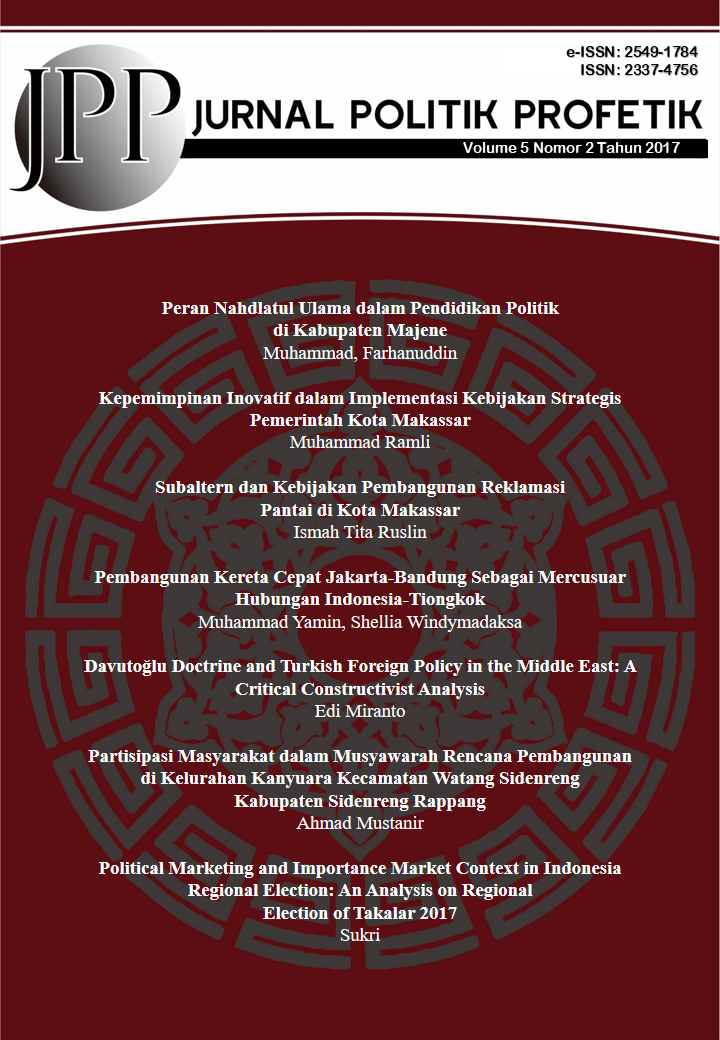Davutoğlu Doctrine and Turkish Foreign Policy in the Middle East: A Critical Constructivist Analysis
Abstract
Referring to the argument that a state’s historic background and geographic location inthe world are inherent elements of its foreign policy narrative which constitutes its identity,
this article examined and brought narratives on the reconstruction of Turkish foreign
policy towards the Middle East which was directed by a foreign policy doctrine of
Davutoğlu as defined Davutoğlu Doctrine. Using a critical constructivist perspective, it
contends that Davutoğlu’s foreign policy vision for Turkey is an attempt to reconstruct
the international role and responsibilities of Turkey through a transformed identity
based on a reinterpretation of its historical heritage and geographic location. This article
concluded that the Davutoğlu Doctrine’s vision was not only an endeavor to overturn
the traditional tendencies in Turkish foreign policy, but also in any ways, is a task of
identity transformation. Further, this new activism has led to a shift in the axis of its
foreign policy from the Western orientation to a more assertive, strict independent foreign
policy that is central to the Davutoğlu Doctrine. Finally, Davutoglu Doctrine can
be recognized that it has reconstructed Turkey’s state identity to reshape Turkish foreign
policy onwards to the Middle East aiming to reposition Turkey as the global representative
and a key player in the region.
Downloads
References
Adler, E. Constructivism in International Relations: Sources, Contributions, and Debates. In Handbook of International Relations, London: SAGE Publications Ltd.,2013.
Alvarez, J., The Grand Strategy of the Republic of Turkey, Stanford University, 2012.
Aras, B., Davutoğlu Era in Turkish Foreign Policy Revisited. Journal of Balkan and Near Eastern Studies, Vol. 16 (4) 2012.
----------- & Gorener, A., National Role Conceptions and Foreign Policy Orientation: The Ideational Bases of the Justice and Development Party’s Foreign Policy Activism in the Middle East. Journal of Balkan and Near Eastern Studies, Vol. 12 (1) 2010.
----------- & Karakyapolat, R., Turkey and the Middle East: Frontiers of the New Geographic Imagination. Australian Journal of International Affairs, Vol. 61 (4) 2010.
Aslan, A., The Foreign Policy-Hegemony Nexus: Turkey’s Search for a “New” Subjectivity in World Politics and Its Implications for US-Turkish Relations. Perceptions, XVII (4) 2012.
Aybet, G., The Evolution of NATO’s Three Phases and Turkey’s Transatlantic Relationship. Perceptions: Journal of International Affairs, Vol. XVII (1), 2012.
Bağcı, H., & Doğanlar, A. A., Changing Geopolitics and Turkish Foreign Policy. Annales Universitatis Mariae Curie-Sklodowska, Vol. XVI (2), 2009.
Balcı, A., Türkiye Dış Politikası İlkeler, Aktörler, Uygulamalar. Istanbul: Etkileşim Yayınları, (2013).
Bozdağlıoğlu, Y. Modernity, Identity and Turkey’s Foreign Policy. Insight Turkey, Vol.10 (1), 2008.
Çalış, S., Turkey’s Integration with Europe: Initial Phase Reconsidered. SAM (Centre for Strategic Research), (June-August), 2000.
Cho, Y. C., Conventional and Critical Constructivist Approaches to National Security: An Analytical Survey. The Korean Journal of International Relations, Vol. 49 (3), 2009.
Davutoğlu, A., Stratejik Derinlik. Istanbul: Küre Yayınları,2001.
-----------------,Zero Problems in a New Era. Retrieved August 18, 2016, from http://foreignpolicy.com/2013/03/21/zero-problems-in-a-new-era/
-----------------, Turkey’s Foreign Policy Vision: An Assessment of 2007. Insight Turkey, Vol. 10 (1), 2008.
-----------------, Principles of Turkish Foreign Policy and Regional Political Structuring. SAM (Centre for Strategic Research), Vol. 3, 2012.
-----------------, Strategic Thinking: Foreign Minister Ahmet Davutoğlu Explains the Turkish Republic’s Place in the World. Cairo Review, Vol. 4 (2012).
----------------, Turkey’s Mediation: Critical Reflections from the Field. Middle East Policy, Vol. XX (1), 2013.
----------------, Teoriden Pratiğe Türk Dış Politikası Üzerine Konuşmalar. Istanbul: Küre Yayınları,2014.
Fuller, G. E., The New Turkish Republic: Turkey as a Pivotal State in the Muslim World. Washington: United States Institute of Peace Press, 2008.
Hopf, T., Constructivism All the Way Down. London: Palgrave Macmillan,2000.
Kardaş, Ş., Turkey under the Justice and Development Party: Between Transformation of “Islamism” and Democratic Consolidation? Critique: Critical Middle Eastern Studies, Vol. 17 (2),2008.
Kirdiş, E., The Role of Foreign Policy in Constructing the Party Identity of the Turkish Justice and Development Party (AKP). Turkish Studies, Vol. 16 (2), 2015.
Kirisci, K., Turkey and the European Union: The Domestic Politics of Negotiating Pre-Accession. Macalester International, Vol. 15 (Article 10),2005.
Kocatürk, U., Atatürk’s Revolutions and Modernization. Atatürk Araştırma Merkezi Dergisi, Vol. V (13) 1998.
Murinson, A., The Strategic Depth Doctrine of Turkish Foreign Policy. Middle Eastern Studies, Vol. 42 (6), 2006.
Onuf, N. G., Constructivism at the Crossroads; or, the Problem of Moderate-Sized Dry Goods. International Political Sociology, Vol. 10 (2),2016.
Özkan, B., Turkey, Davutoglu and the Idea of Pan-Islamism. Survival: Global Politics and Strategy, Vol. 56 (4), 2014.
Turan, İ., Turkey’s Iran Policy: Moving Away from Tradition? Analysis on Turkey, (June 25),2010.
Vincent, J., Waltz, K., Keohane, R. O., Gilpin, R., Badie, B., Ruggie, J. G., … Derian, J. Der., The Future of International Relations: Masters in the Making? London: Routledge,1997.
Wendt, A. E., Social Theory of International Politics. Cambridge: Cambridge University Press,1999.
Yeşiltaş, M., The Transformation of the Geopolitical Vision in Turkish Foreign Policy. Turkish Studies, Vol. 14 (4), 2013.
---------------, Turkey’s Quest for a “New International Order”: The Discourse of Civilization and the Politics of Restoration. Perceptions, Vol. XIX (4), 2014.
Zehfuss, M., Constructivism and Identity: A Dangerous Liaison. European Journal of International Relations, Vol. 7 (3), 2001.















